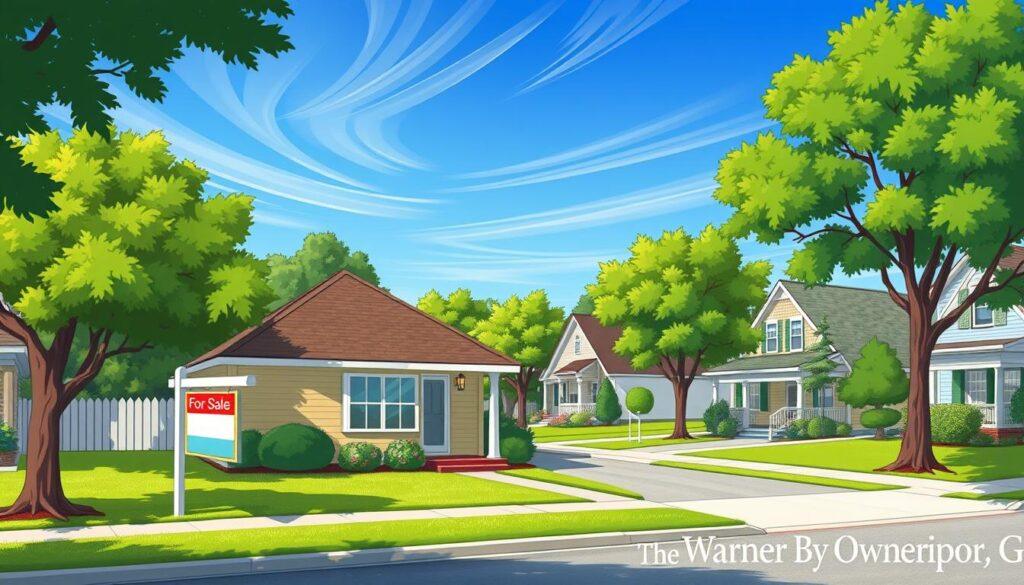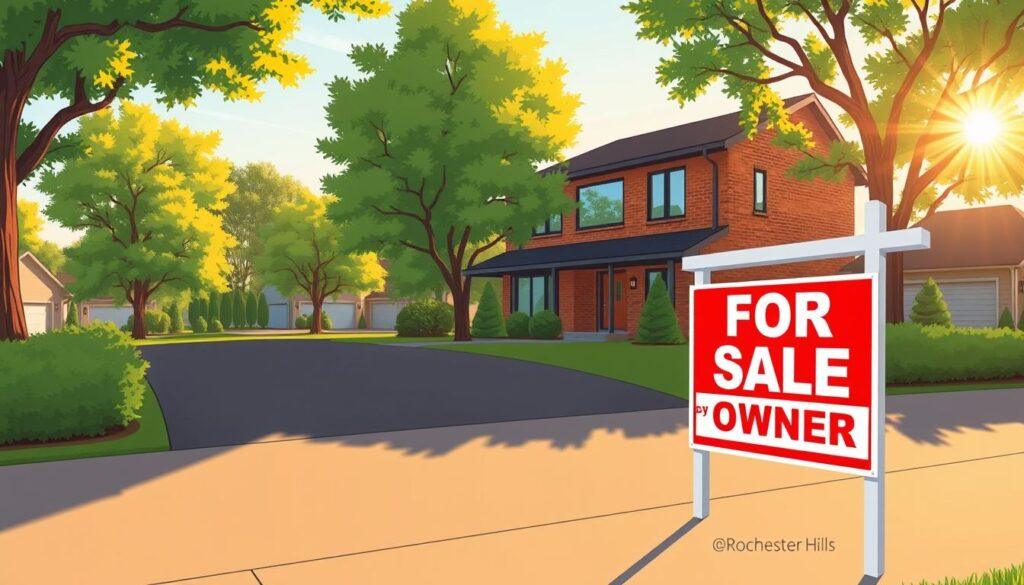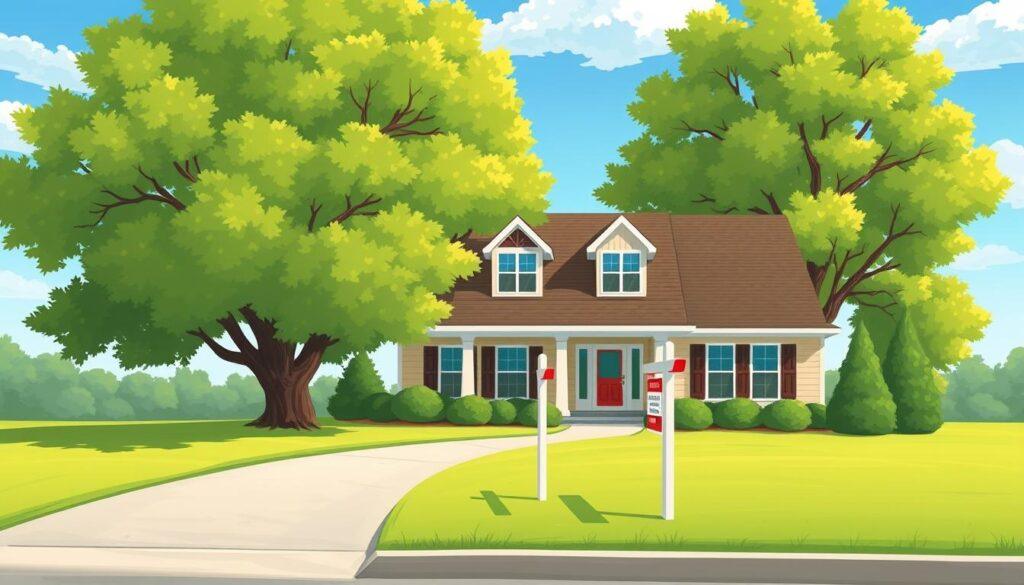Ever wondered why some homes sell fast, while others take months? It’s because even experienced sellers make common mistakes. These errors can cost them time and money. Knowing what not to do is key, especially since 70% of agents say overpricing is the biggest mistake.
By avoiding these pitfalls, you can sell your home successfully. This means making smart choices and steering clear of common blunders.
Key Takeaways
- Most common default is overpricing, according to a significant number of real estate professionals.
- Real estate agents typically charge 5% to 6% commission on the sale price.
- The timing of your sale can dramatically impact the final price—spring and summer being more favorable.
- High-quality photography and virtual tours can increase buyer interest and urgency.
- Potential listing prices should be based on accurate market analysis to attract the right offers.
Understanding the Costs of Selling Your Home
Selling your home comes with many costs. Many sellers don’t think about these expenses, leading to common mistakes. Knowing these costs can help you avoid them and keep more of your profit.
Agent Commissions
Real estate agent commissions are a big expense. They usually cost between 2.5% and 3% of the home’s sale price. For a $450,000 home, this could be $11,250 to $13,500. This cost is a big part of your profit, so it’s important to plan for it.
Closing Costs and Fees
Closing costs are often forgotten but can be 1% to 3% of the sale price. Buyers pay for things like title insurance and loan origination fees. These costs add up to thousands of dollars. Property taxes can also add to the cost, with some of it coming back to you.
Moving Expenses
Moving costs are often underestimated. They can range from $878 to $2,555, with an average of $1,699. If you need professional movers or have a lot to move, this cost can go up. Budgeting for these expenses can help you avoid another common mistake.
| Cost Type | Estimation | Percentage of Sale Price |
|---|---|---|
| Agent Commissions | $11,250 – $13,500 | 2.5% – 3% |
| Closing Costs | $4,500 – $13,500 | 1% – 3% |
| Moving Expenses | $878 – $2,555 | N/A |
| Potential Home Repairs | Varies | N/A |
Knowing these costs helps you plan better. With good planning, you can sell your home without making common mistakes.
The Importance of Hiring a Real Estate Agent
Getting a professional real estate agent can make selling your home better. Some people try to sell by themselves to save money. But, this can lead to mistakes that hurt the sale price and slow down the process.
Benefits of Professional Guidance
Working with a real estate agent has many benefits:
- Expert Negotiation: Agents know how to negotiate well, often getting offers 25% higher than FSBO sellers.
- Local Market Knowledge: Realtors® know the area well, helping set the right price and marketing plan.
- Access to Resources: Agents have a big network, including repair experts and inspectors, for a smooth sale.
- Marketing Expertise: They use good marketing, making your property more visible through different channels.
- Time-Saving: Realtors® do tasks like showings and inquiries, saving you time.
Common Pitfalls of Going FSBO
Selling by yourself can cause problems:
- Limited Market Reach: FSBO listings don’t get on the MLS, reducing exposure to buyers.
- Higher Financial Risk: Without a realtor, you might undervalue your home or struggle with negotiations.
- Legal and Documentation Challenges: Without contract knowledge, you might face legal issues.
- Time Consumption: Selling a home yourself takes longer, as it’s a lot of work.
Considering these points, using a real estate agent is key for a successful sale. Their expertise helps avoid mistakes and makes the process smoother and more profitable.
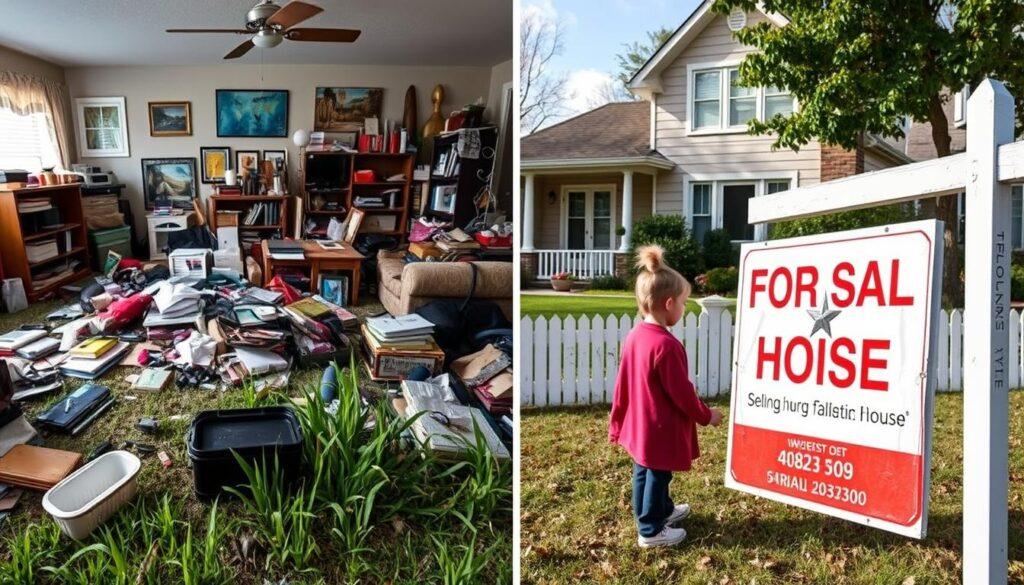
| Aspect | With Real Estate Agent | FSBO |
|---|---|---|
| Selling Price | Typically 25% higher | Lower average sale price |
| Market Exposure | MLS and extensive marketing | Limited to personal networks |
| Negotiation | Professional tactics | Less experience in strategies |
| Legal Assistance | Thorough understanding | Higher risk of documentation errors |
| Time Investment | Minimal for seller | Significante time required |
Pricing It Right: A Key to Success
Setting the right price is key when selling your home. Knowing the local real estate market helps avoid common mistakes. A good market analysis shows recent sales, pending listings, and what’s available now.
Market Analysis for Accurate Pricing
A Comparative Market Analysis (CMA) gives insights into similar home sales. It’s important to look at recent sales, current listings, and upcoming ones. Understanding the market helps set a fair price for your home.
Using data to analyze the market can help attract more buyers. Knowing how to price your home lets you adjust your asking price and respond to market changes.
Pitfalls of Overpricing Your Home
One big mistake is overpricing your home. This can scare off potential buyers and make your home sit on the market too long. Overpricing often comes from adding emotional value or trying to cover renovation costs.
Ignoring the market can lead to fewer offers and lower prices. Setting a price that buyers are willing to pay is crucial. It creates urgency and can lead to multiple offers.
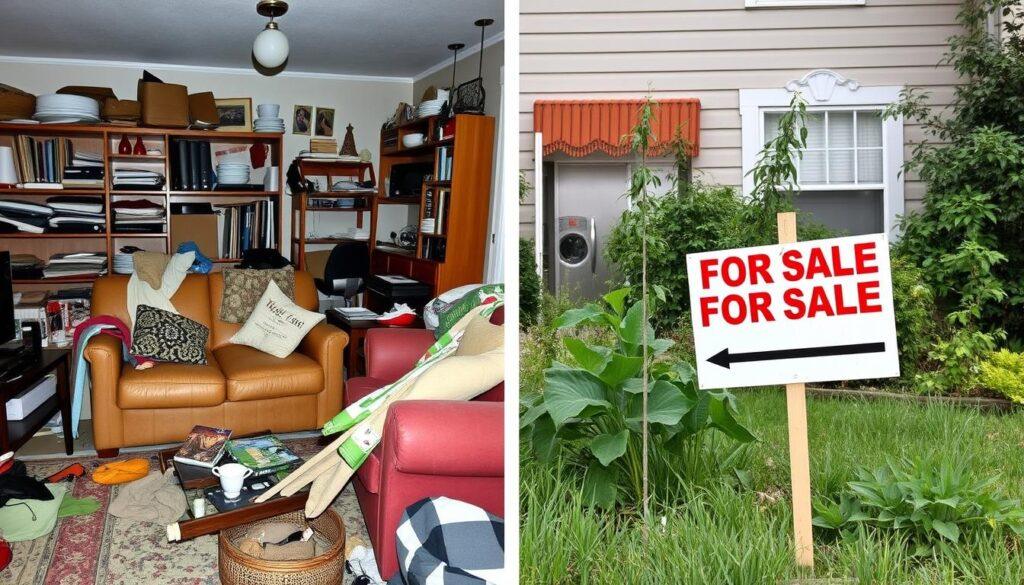
| Strategy | Description | Potential Impact |
|---|---|---|
| Market Analysis | Investigating recent sales and current listings | Helps set competitive pricing |
| Understand Emotional Pricing | Avoid pricing based on personal sentiments | Mitigates the risk of overpricing |
| Adjust Based on Feedback | Be flexible with pricing depending on market responses | Increases chances of a successful sale |
| Seek Professional Help | Involve a realtor for expert insights | Ensures accurate pricing and strategy |
What Not to Do When Selling Your Home: Hiding Major Repairs
When selling a home, being open is key. One big mistake is not telling buyers about big repairs or problems. If buyers find out about these issues during inspections, it can ruin trust and hurt the sale.
The Risks of Being Dishonest with Buyers
Keeping major repairs hidden can lead to big problems. Buyers might decide not to buy if they find out about hidden issues. This can cause:
- Potential legal issues: Sellers must tell buyers about known problems or face legal trouble.
- Increased sale delays: Talking about hidden problems can make the sale take longer.
- Lower selling prices: Hiding issues can hurt the home’s reputation and scare off buyers.
Benefits of Transparency in Home Selling
Telling the truth about a home’s condition builds trust and makes talks easier. Sellers who share about repairs can control the conversation and avoid buyers backing out after inspections. Being open also protects sellers from future problems or claims.
To do well when selling, sellers should:
- Do a pre-inspection to find and fix any issues.
- Tell buyers about any big repairs, like plumbing or pest problems.
- Be honest with potential buyers, so they know the home’s history.
Staging Your Home for Maximum Appeal
Staging is key to selling your home fast and for a good price. Homes that are staged well sell quicker and for more money. It’s important to make your home welcoming and avoid common mistakes to attract buyers right away.
Impact of Staging on Sale Price
A well-staged home can really pay off. Homes staged professionally sell for 25% more than unstaged ones. Also, staging can cut down the time a house is on the market by 73% in 2023. This shows that good presentation is a big plus for sellers.
Tips for Effective Home Staging
To make your home more appealing and avoid common mistakes, follow these tips:
- Declutter: Remove personal items and family photos to make a space that buyers can imagine themselves in.
- Focal Points: Create a main focus in each room to keep it organized and welcoming.
- Neutral Colors: Choose neutral paint colors; dark colors can make rooms seem smaller.
- Strategic Decor: Place art and mirrors at eye level to add interest without cluttering walls.
- Furniture Arrangement: Use minimal furniture to make spaces feel open and inviting.
- Minor Upgrades: Small changes like new paint or modern hardware can refresh your home and attract buyers.
Staging makes your home look better, helps create a good first impression, and lets buyers see themselves living there. By following these tips, you can sell your home faster and possibly for more than you ask.
| Staging Tips | Benefits |
|---|---|
| Declutter and depersonalize | Creates a neutral canvas for buyers |
| Hang decor at eye level | Improves visual impact |
| Use neutral paint colors | Makes rooms feel larger |
| Keep furniture minimal | Enhances spaciousness |
| Invest in small upgrades | Increases overall appeal |
Conclusion
Knowing the common mistakes when selling a home is key for a smooth transition. Avoiding errors like overpricing can save time and interest from buyers. The right price attracts buyers and gives you an edge in the market.
Marketing your home well is crucial, especially with most buyers looking online. Good photos and staging make your home stand out. A well-prepared home with all the right documents builds trust with buyers.
While hiring a real estate agent might seem expensive, their expertise is worth it. They help with marketing, negotiations, and legal stuff. By avoiding these common mistakes, you can sell your home successfully and profitably. For help, consider reaching out to Pierre Home Buyers for personalized advice.
FAQ
What are the common mistakes to avoid when selling my home?
How can I understand the costs involved in selling my home?
FAQ
What are the common mistakes to avoid when selling my home?
Don’t make the mistake of not hiring a professional real estate agent. Also, avoid mispricing your home and neglecting repairs. Skimping on home staging is another error to avoid. Knowing these mistakes can help you sell your home successfully.
How can I understand the costs involved in selling my home?
Agent commissions usually range from 5% to 6% of the sale price. Closing costs are about 1% to 3% of the sale price. Moving expenses can be around
FAQ
What are the common mistakes to avoid when selling my home?
Don’t make the mistake of not hiring a professional real estate agent. Also, avoid mispricing your home and neglecting repairs. Skimping on home staging is another error to avoid. Knowing these mistakes can help you sell your home successfully.
How can I understand the costs involved in selling my home?
Agent commissions usually range from 5% to 6% of the sale price. Closing costs are about 1% to 3% of the sale price. Moving expenses can be around $1,700. Remember to budget for repairs and staging to avoid surprises.
Is it worth it to hire a real estate agent instead of selling my home on my own?
Yes, hiring an experienced agent is beneficial. They handle negotiations and paperwork. They also know the local market well, helping set a competitive price. Homes sold by agents often sell for more than those sold by owners.
How should I price my home?
Price your home based on market data, not emotions. Use a comparative market analysis to find a good price. This price should attract buyers without being too high.
What happens if I hide major repairs when selling my home?
Hiding major repairs can make buyers distrust you. If problems are found during inspection, it could ruin the sale. Being honest about repairs helps in negotiations and builds trust.
How can staging affect my home’s sale price?
Staged homes sell 88% faster and can get up to 20% more than unstaged homes. Good staging makes your home inviting. This can attract more buyers and increase your sale price.
,700. Remember to budget for repairs and staging to avoid surprises.
Is it worth it to hire a real estate agent instead of selling my home on my own?
Yes, hiring an experienced agent is beneficial. They handle negotiations and paperwork. They also know the local market well, helping set a competitive price. Homes sold by agents often sell for more than those sold by owners.
How should I price my home?
Price your home based on market data, not emotions. Use a comparative market analysis to find a good price. This price should attract buyers without being too high.
What happens if I hide major repairs when selling my home?
Hiding major repairs can make buyers distrust you. If problems are found during inspection, it could ruin the sale. Being honest about repairs helps in negotiations and builds trust.
How can staging affect my home’s sale price?
Staged homes sell 88% faster and can get up to 20% more than unstaged homes. Good staging makes your home inviting. This can attract more buyers and increase your sale price.




